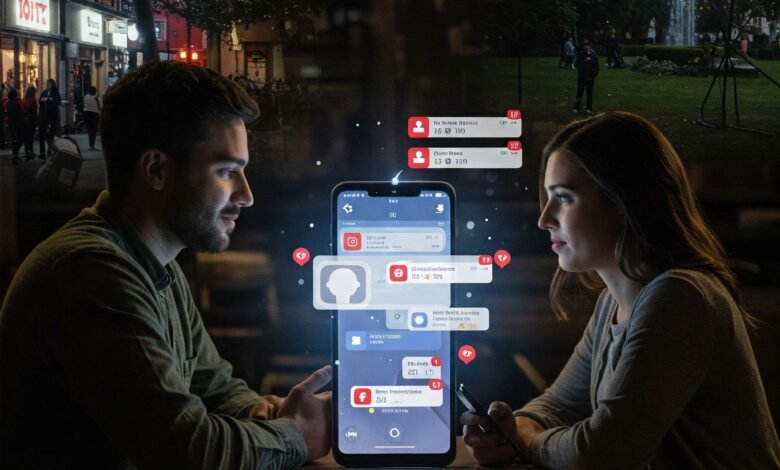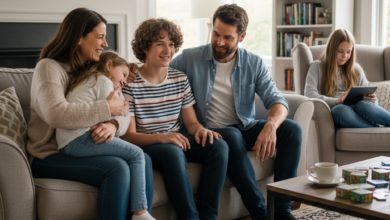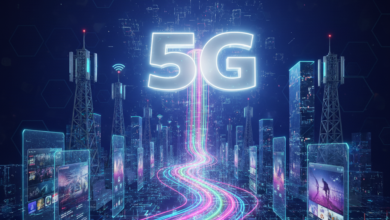The Impact of Social Media on Human Relationships: Shaping Friendships, Romantic Relationships, and Family Dynamics

Introduction to Social Media and Relationships
In recent years, social media has emerged as a pivotal force in the way individuals interact and maintain connections. Platforms such as Facebook, Instagram, and Twitter have become intertwined with our daily lives, significantly influencing personal dynamics among friends, romantic partners, and family members. With over 4 billion users globally, the reach of social media is profound, providing unprecedented opportunities for networking, communication, and relationship building.
The role of social media in shaping human relationships cannot be overstated. For many, these platforms serve as the primary means of staying in touch with friends and family, especially in an increasingly fast-paced world where geographical barriers are less of a concern. The instant nature of social media communication allows individuals to share moments of their lives in real-time, fostering a sense of closeness and immediacy, even if physical distance remains.
However, while social media significantly enhances connectivity, it is essential to recognize its complexities. The way we present ourselves online—whether through curated photos or status updates—can sometimes lead to misconceptions and unrealistic expectations in relationships. Moreover, the emphasis on virtual interactions may detract from face-to-face communication, potentially affecting the depth of relationships. Thus, understanding the influence of social media is crucial for navigating its challenges and opportunities in our relationships.
As we delve deeper into this topic, it will be critical to examine not only the benefits but also the potential drawbacks of social media. Understanding these dynamics will help individuals manage their relational landscapes more effectively in an era dominated by digital interactions.
The Evolution of Friendships in the Digital Age
The advent of social media has significantly transformed the landscape of friendships, creating new avenues for connection that were previously unimaginable. Platforms such as Facebook, Instagram, and Twitter have enabled individuals to maintain long-distance friendships with ease, reinforcing bonds that might have waned in a more traditional setting. The ability to share experiences, thoughts, and emotions instantaneously fosters a sense of closeness, despite geographic barriers. Social media encourages individuals to stay updated on each other’s lives through posts, photos, and videos, helping to sustain relationships that might otherwise fade.
Moreover, social media provides the opportunity to create new connections. Individuals can join interest-based groups and communities which allow them to meet like-minded people. As a result, friendships formed online can lead to meaningful connections that transcend physical proximity. The sharing of common interests and experiences can establish a strong foundation for these relationships, often manifesting in offline interactions as friendships grow and evolve.
In the digital age, maintaining friendships has become both easier and more complex. Social media undoubtedly plays a crucial role in shaping the dynamics of friendships, highlighting the necessity for individuals to navigate these changes thoughtfully and consciously.
Social Media’s Role in Romantic Relationships
The rise of social media has fundamentally transformed the landscape of romantic relationships, providing a unique platform for individuals to connect, communicate, and express their feelings. Various social networking sites enable users to meet potential partners through mutual friends or interest-based groups, facilitating the formation of new romantic connections. This connectivity has expanded the dating pool beyond traditional boundaries, allowing relationships to blossom in ways that were previously unimaginable.
Moreover, social media has significantly altered the way couples communicate. It paves the way for quick and convenient interaction, enabling partners to share their daily lives through status updates, photos, and instant messages. However, this ease of communication is not without its complications. Instances of social media jealousy can arise when one partner feels insecure about the other’s online interactions. Such feelings may stem from seeing their partner engage with exes, friends, or strangers, which can lead to misunderstandings and tension within the relationship.
Additionally, the act of posting relationship milestones on social media can have both positive and negative implications. On one hand, sharing joyous moments, such as anniversaries or vacations, can strengthen emotional bonds and publicly affirm the relationship. Conversely, couples may feel pressured to portray an idealized version of their relationship, leading to unrealistic expectations. Privacy also presents a significant challenge; couples must navigate the fine line between sharing their relationship with the public and maintaining a sense of intimacy. The choice of what to share can impact both partners, as oversharing may lead to discomfort or boundary violations.
In examining the role that social media plays in shaping modern romantic relationships, it becomes evident that while it offers opportunities for connection, it also introduces complexities that must be managed for healthy partnerships. Balancing the benefits of online interaction with the potential pitfalls is essential for sustaining fulfilling romantic relationships in the digital age.
Navigating Family Dynamics in the Era of Social Media
In the contemporary landscape, social media plays a pivotal role in shaping familial relationships, offering both opportunities and challenges. On one hand, platforms such as Facebook and Instagram facilitate the maintenance of family connections, particularly in a world where physical distances often separate loved ones. These channels enable families to share updates, milestones, and photos, fostering a sense of togetherness despite geographical barriers. Additionally, social media serves as a vital tool for family members to stay informed about each other’s lives, enhancing bonding and communication.
However, the integration of social media into family dynamics is not without its complications. Differing opinions on the appropriate use of social platforms can lead to tensions among family members. For instance, while some individuals embrace social media as an essential communication tool, others may be more cautious, viewing it as a source of distraction or negativity. This divergence can create misunderstandings and conflicts, as family members struggle to reconcile their varying perspectives on technology’s role in their lives.
Furthermore, the impact of social media on parenting is an essential consideration. Parents are often faced with the challenge of ensuring their children’s online safety in an environment that is both appealing and potentially perilous. Social media platforms expose children to various risks, including cyberbullying, inappropriate content, and privacy concerns. Therefore, parents must actively engage in discussions about responsible social media usage, providing guidance on how to navigate these platforms safely. Strategies such as setting privacy settings, monitoring online activities, and fostering open dialogue can empower children to use social media responsibly.
As the influence of social media continues to evolve, families are tasked with finding a balance between the benefits of connectivity and the complexities that arise from differing attitudes towards its use. Understanding these dynamics is crucial for nurturing positive relationships within the family unit in this digital age.
The Psychological Effects of Social Media on Relationships
The advent of social media has transformed the way individuals interact, fostering both connection and disconnection among users. One significant psychological aspect is social comparison, a phenomenon where individuals evaluate their own worth through the lens of others’ online portrayals. Research reveals that frequent exposure to idealized images and curated lifestyles can lead to feelings of inadequacy, envy, and low self-esteem, particularly in friendships and romantic relationships. These negative emotions can hamper genuine interactions, resulting in strained relationships.
Moreover, loneliness has become a paradoxical outcome of social media usage. While these platforms are designed to connect users, many individuals report feeling isolated despite having numerous online contacts. The superficial nature of online interactions often lacks depth and emotional support, leading to an increase in perceived loneliness. This disconnect can adversely affect both existing relationships and the ability to form new ones, as individuals may struggle to establish meaningful connections outside of the virtual realm.
The fear of missing out (FOMO) further exacerbates the psychological effects of social media. This phenomenon is characterized by the anxiety that arises when one perceives that others are engaging in fulfilling activities without them. FOMO can result in compulsive social media usage, leading users to constantly check their feeds for updates. This behavior not only distracts from real-life experiences but also creates a cycle of anxiety, promoting a sense of exclusion that can damage the fabric of friendships and familial bonds.
Studies indicate that the emotional impact of social media interactions can be profound, influencing users’ overall well-being. Relationships formed and maintained online may lack the emotional intimacy that characterizes face-to-face interactions, leading to a decline in relationship satisfaction. Understanding these psychological effects is crucial for navigating the challenges posed by social media, fostering healthier and more genuine relationships in an increasingly digital world.
Challenges and Conflicts Arising from Social Media Use
The advent of social media has profoundly transformed the nature of human relationships, creating both opportunities and challenges. While platforms such as Facebook, Instagram, and Twitter enable individuals to connect with friends and family across vast distances, they also introduce a complex array of challenges that can lead to conflicts within friendships, romantic relationships, and family dynamics.
One of the primary issues associated with social media use is the potential for miscommunication. Online interactions often lack the nonverbal cues that are crucial in face-to-face conversations, leading to misunderstandings. For instance, a text message or post may be perceived as sarcastic or dismissive when the intention was completely benign. This lack of clarity can cause rifts between individuals who might otherwise have harmonious relationships. Furthermore, the asynchronous nature of social media conversations can result in delayed responses, fostering feelings of neglect or anxiety within friendships and partnerships.
Misunderstandings are often exacerbated by the curated nature of online interactions. Individuals may present idealized versions of their lives, evoking comparisons among peers and potentially fostering jealousy or discontent. For couples, the pressure to portray a perfect relationship on social media can lead to heightened expectations and subsequent disappointment. It is not uncommon for partners to argue over perceived slights or absences due to one party’s online activity, rather than addressing concerns directly.
Moreover, the challenge of balancing online presence with offline relationships is significant. The allure of social media can divert attention away from in-person interactions, leading to a decline in the quality of time spent with loved ones. The phenomenon of ‘phubbing,’ where individuals ignore their companions in favor of their phones, is a growing concern that can create feelings of isolation and resentment within family units and friendships. Effectively navigating these challenges requires open communication, mutual understanding, and a willingness to prioritize genuine connections over online interactions.
Positive Aspects of Social Media in Relationship Building
Social media has transformed the landscape of human relationships, offering numerous benefits that contribute to community building and the formation of meaningful connections. One of the primary positive aspects of social media is its ability to connect individuals across geographical boundaries. With platforms such as Facebook, Twitter, and Instagram, people can easily share experiences, ideas, and support with family and friends, regardless of their physical location.
Moreover, social media enables individuals to discover like-minded individuals with similar interests and passions. For instance, online communities centered around hobbies, professional networks, or health groups provide opportunities for individuals to form friendships based on shared experiences. Members can exchange advice, celebrate milestones, and provide support in times of need. This fosters a sense of belonging that many find invaluable, particularly in a rapidly changing world.
Additionally, social media plays a significant role in maintaining existing relationships. Platforms allow users to stay connected with friends and family, sharing updates and photos that strengthen bonds and promote interaction. This ongoing communication can help mitigate feelings of isolation, especially for individuals living far from loved ones. Social media often becomes a medium through which couples maintain their relationship amidst long distances, showcasing how digital communication can enhance romantic partnerships.
Real-life examples further illustrate the positive impact of social media. For instance, many people have reported reigniting old friendships through social networking sites, leading to meaningful reconnections. Additionally, support groups on platforms like Facebook often provide essential resources and emotional assistance to those dealing with various life challenges, emphasizing the importance of community in nurturing well-being.
In summary, the positive aspects of social media are evident in its ability to build community, foster new relationships, and support existing ones. Those who actively engage with these platforms often find themselves forming deeper connections with others, creating a more connected and supportive atmosphere overall.
Future Trends: Social Media and Relationships
As we look towards the future, the landscape of social media continues to evolve at an unprecedented pace, significantly affecting human relationships. Emerging technologies, such as artificial intelligence (AI) and augmented reality (AR), play a pivotal role in shaping how individuals interact on social platforms. AI is increasingly being integrated into social media, providing personalized experiences that cater to users’ interests and preferences. This trend is expected to deepen connections by fostering more meaningful interactions based on shared interests and common values.
Moreover, advancements in AR technology could revolutionize the way we communicate. By enabling immersive experiences, users may find themselves engaging with friends and family in virtual spaces, enhancing the sense of presence despite physical distances. This technological progression may further redefine what it means to maintain relationships, allowing individuals to share life events in more vivid and engaging ways.
Changing societal norms also contribute to the future of social media relationships. As younger generations grow up exposed to digital communication, traditional boundaries may shift. The normalization of online friendships, romantic connections, and virtual family interactions will likely continue, impacting how relationships are formed, nurtured, and maintained. This shift may necessitate a reevaluation of social etiquette and communication strategies, as individuals navigate hybrid environments where online and offline interactions coalesce.
Furthermore, the growing emphasis on mental health awareness is expected to influence how social platforms develop features aimed at promoting healthy interactions. Tools that encourage users to reflect on their social media habits and prioritize meaningful connections might emerge, fostering better emotional well-being within relationships.
In conclusion, as technology advances and societal norms shift, the impact of social media on relationships is poised to transform significantly. The integration of AI and AR, combined with an evolving understanding of interpersonal dynamics, suggests a future where digital connections become increasingly integral to human relationships.
Conclusion: Reflecting on the Dual Nature of Social Media
In assessing the impact of social media on human relationships, it is essential to recognize its dual nature. On one hand, platforms that facilitate instant communication and connectivity have transformed how individuals forge friendships, maintain romantic relationships, and interact with family members. Social media enables individuals to keep in touch with loved ones across vast distances, share significant life events, and foster a sense of community. It serves as a modern tool for socialization, allowing users to stay connected in real time, thus creating opportunities for relationship-building that would not have existed otherwise.
However, the influence of social media is not unequivocally positive. The same platforms that encourage connection can inadvertently facilitate misunderstandings, jealousy, and unrealistic comparisons. The curated nature of online personas often leads to a distorted perception of reality, impacting how individuals engage and relate with one another. Furthermore, excessive reliance on digital communication can take a toll on face-to-face interactions, leading to a decline in meaningful, offline relationships. This underscores the necessity for users to be mindful of their social media habits and the implications these might have on their personal connections.
As we navigate this evolving digital landscape, it is crucial for individuals to reflect on their own social media use and its effects on their interpersonal dynamics. Engaging with social media should not come at the expense of authentic relationships; striking a balance between online and offline interactions is key. By understanding both the advantages and drawbacks of social media, users can cultivate healthier relationships that leverage technology without compromising emotional intimacy. In conclusion, a conscious approach to social media can enhance our connections while mitigating potential negative impacts on human relationships.






















